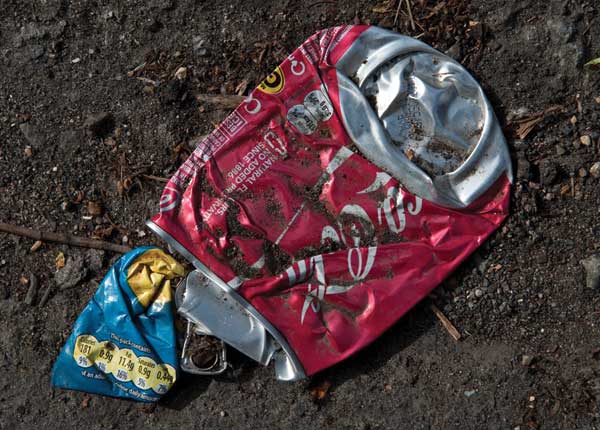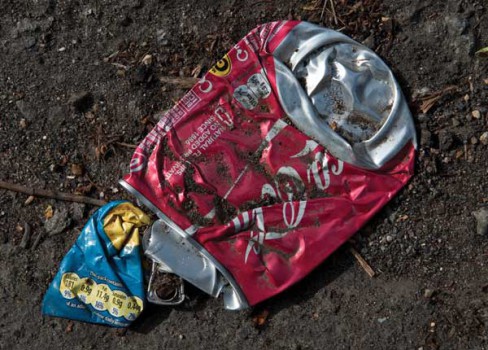
The City of Sydney has installed a small fleet of container-eating ‘reverse vending machines’ it hopes will encourage far more people to consciously recycle cans and bottles, which would otherwise be thrown into everyday rubbish bins by handing out small rewards.
The new machines, similar to ones already in operation in Europe, offer consumers the opportunity to collect “two-for-one food truck vouchers”, make a 10 cent donation to charity or go into the draw for a prime seat on the Harbour for New Year’s Eve celebrations as part of an ongoing crackdown on litter.
With a capacity of around 2000 containers before they need to be emptied, the hi-tech civic refuse crushers are the latest public push by Lord Mayor Clover Moore in a wider battle to finally get a national container deposit scheme – like the one now operating in South Australia up-and-running to help relieve waste disposal pressures on local governments.
Although opposed by many major beverage companies, local governments have for years been agitating for a deposit-based scheme that would help build-in the cost of packaging disposal and recycling while encouraging consumers to keep containers out of landfill by being able to get deposit refunds.
Even though Sydney’s new reverse vending machines will, in reality, barely scratch the side of the annual mountain of spent containers that needs to be shipped off for recycling, the CBD council is clearly betting that the high-profile devices will create a tangible dent in consumer psychology on waste management.
The City said in a statement that it is estimated that around “15,000 bottles and cans are littered or thrown into landfill every minute across Australia.”
Ms Moore said that “only about 42 per cent of bottles and cans are recycled annually in NSW” and that the City was working hard to lift recycling rates through “a range of new initiatives.”
“Container deposit schemes significantly increase recycling, reduce waste and protect wildlife and the environment from plastic pollution,” Ms Moore said.
“We’re taking what action we can to reduce the amount of waste going to landfill, but will continue to lobby state and federal governments for reform on this issue.”
Clean-Up Australia is backing the council’s push, with founder and chairman, Ian Kiernan, cautioning that in NSW the amount of dumped containers picked-up during volunteer rubbish clean-up days had edged up 3 per cent since 2012.
“In 2013 beverage containers and their associated rubbish made up 41 per cent of the total rubbish and 59 per cent of the top ten rubbish items reported by volunteers in NSW, Mr Kiernan said.
“In 2013 beverage containers and their associated rubbish made up 41 per cent of the total rubbish and 59 per cent of the top ten rubbish items reported by volunteers in NSW. This was an increase of 3 per cent over 2012,” Mr Kiernan said.
Clean-Up Australia is also warning there are safety consequences and costs from poor recycling management and estimates that there “are around 40,000 injuries from broken glass bottles in Australia a year and 5,000 of these injuries require medical treatment.”
Even before their official launch, there seems to be little public resistance to Sydney’s new reverse vending machines. Units located on Dixon Street Mall, Haymarket and Alfred St and Circular Quay had already collected more than 6000 containers even prior to their official launch a City spokesperson said.
The machines have been supplied by Envirobank, a company that specialises in litter management for high traffic areas including public places, events and campuses.
A substantial benefit of the machines is that because they compress the containers they accept, the collection capacity of disposal locations is greatly increased while manual collection and emptying of bins is reduced. At the same time it can incentivise returns through a reward scheme that can applied either via a card or voucher system.
While the City of Sydney has opted for an incentive based scheme, Envirobank says it “operates effectively and efficiently in both non-deposit and deposit markets” and works with “the beverage industry and other stakeholders in the recycling chain to help recover the highest percentage of beverage containers and turn those into a valuable commodity.”
Comment below to have your say on this story.
If you have a news story or tip-off, get in touch at editorial@governmentnews.com.au.
Sign up to the Government News newsletter
6 thoughts on “Sydney’s new reverse vending machines swallow cans, spit out food vouchers”
Leave a comment:
Most read
Scathing report finds little has changed at PwC
Qld council welcomes progress on massive battery system
Inquiry to consider how federal govt can address councils’ sustainability issues
‘Local’ procurement turns out not to be so local, committee hears
Another report finds local government falling down on cyber security


High Time for this sort of thing! Well done… need them every where along with a National Deposit System…. Cans / Bottles / Containers can no longer be the scourge of the modern era…. They should be as common as the same vending machines that dispense these all in the first place
Do the machines wash out the bottles as well?
why would they need to? All crushed, and taking somewhere for melting/shredding etc
Very neat example of gamification, indeed – submitting junk and being rewarded immediately. Proves that recycling can be funny and useful in the same time. I remeber a similar project by Wolkswagen – I think they called it the Fun Theory. It was about a street rubbish bin that was making a funny sound – as if the bin was so deep that the junk coudn’t reach the bottom. But it was simply a concept while this is now a reality in Sydney, great.
Benefit of the machines is needed to compress the containers they accept. The collection capacity of disposal locations is greatly increased while manual collections of emptying bins is reduced. Vending machines operates effectively and efficiently in both non-deposit and deposit markets and works with the beverages industry and other stockedholders in the recycling chain to help recover the highest percentage of breverage container and turn into a vulnerable community.